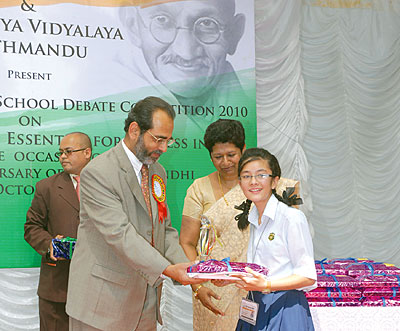 |
Last week on Gandhi Jayanti, this Beed was judging an inter-school debate competition at Kendriya Vidyalaya, the Indian embassy school. The quality of the debate was as good as that in any school in the world. The quality of language and delivery was great, and the majority of the participants were girls. Further, it was clear the participants had done their research using international sources, indicating the extent to which the internet has penetrated their lives.
The students cited US presidents and global business leaders, which made one wonder how our political leaders can connect with such globally oriented minds. When some mentioned Warren Buffet, it reminded me of a political leader who once asked whether he was the man after whom buffet lunches and dinners had been named. The gap between digitally savvy youth and those who don't even have an email ID is sure to widen in years to come.
The debate competition also raised another question. Why is it that we have just one such competition for every 10 fashion shows, and why do schools that work so hard to get their kids into the glamour world not think debates, quizzes and elocution skills are important? Indeed, it seemed that those children at the debate who had the fanciest school uniforms and the best hairdos performed the worst. Why is it that for us aping global fashion, so easy to do, does not go hand-in-hand with improving other soft skills like public speaking or communication?
When we get used to being negative and talk about how the country, including we ourselves, are going to the dogs, sometimes you need an outsider to provide a different perspective. Barry O' Brien, the popular Kolkata-based Southasian quizzer, visits Nepal each year to conduct a corporate quiz organised by Boss magazine. He notes how the quality of quizzes has improved over the years, and how Nepali participants are approaching the competencies of their Southasian contemporaries. You can hear this from other people who regularly visit Nepal and talk about the improving quality of writing in our papers and the food in our restaurants. A visit to Lalitpur's Jhamel can confirm the latter, as young restaurateurs there are producing food comparable to that of the food capitals of Europe.
The interests of Nepali youth are also expanding, and many are ready to pay Rs 350 for the very well written and produced novel by Buddhisagar, Karnali Blues. It is such interests that spur Nepalis to attend readings, screenings and concerts; the hunger for knowledge, information and networking is immense.
Skeptics may say these are Kathmandu-centric traits. I strongly urge people to chat with youth in the smaller towns and villages. They'll tell you all about how to prepare for the TOEFL or feed you the latest Hollywood gossip, just like their Kathmandu counterparts. In their quest to become global citizens, their horizons are expanding in something of a silent movement.
The biggest challenge will of course lie in our own definition of youth, especially in the political sphere, where every walking leader is referred to as a youth leader and only graduates once confined to a wheelchair. For all leaders � business, political and civil society � the challenge is to understand this transition and figure out how to accommodate the voices, hopes and aspirations of Nepali youth.
Wishing all readers sacrifice-free festivities.



